A research methodology using Mindmanager concept mapping & design thinking
In this entry I describe how I am using technology to support my iterative design-thinking based research process.
My approach is based upon the "design thinking" methodology. The process works as iterations of "inspiration, ideation, implementation" in which an initial emphasis upon "inspiration" shifts (but not completely) through time towards an emphasis upon "implementation":
- Being inspired by the work of other researchers and practitioners, along with first-hand encounters in the world (in teaching, learning, design etc);
- Abstracting from this concepts, propositions, variables, etc;
- Creating conjectures about the world (or in design-language "prototypes") based upon those ideas;
- Creating opportunities to realistically test those conjectures;
- Reporting upon the success or failure of the conjectures, and their implications;
- Forming further iterations and directions for research.
I record my research activities upon a concept map (using the sophisticated Mindmanager mapping tool), in a Warwick Blogs blog (linked to from within the map, and keyword tagged using the same schema as the map), and as annotations on pdf files (using a Mac, searchable with Spotlight). The map is structured at the top level as follows:
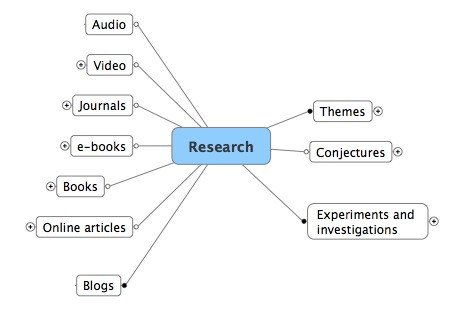
The left-hand side of the map records my readings, along with videos and audio podcasts. Further "inspiring" events and materials are recorded on my Inspires Learning blog, and tagged as "inspiration" (to be added to the map shortly). I like to group my readings together according to source, as this gives me a sense of where I am finding good materials. For example, the Journals node already indicates sources that I am finding to be rich in useful materials:

Opening up the Books node reveals how I am working through the contents of some key books chapter by chapter. I will often write a review of each chapter in my blog. Records in the blog are linked to such literature review blog entries. See how I have added a "task completion" counter to the "Developing Creativity in Higher Education" book, indicating my progress through the book. I will be making further use of icon tagging and task tagging to manage the process. Some of the nodes (especially in Journals and e-Books) contain actual electronic articles as attachments.
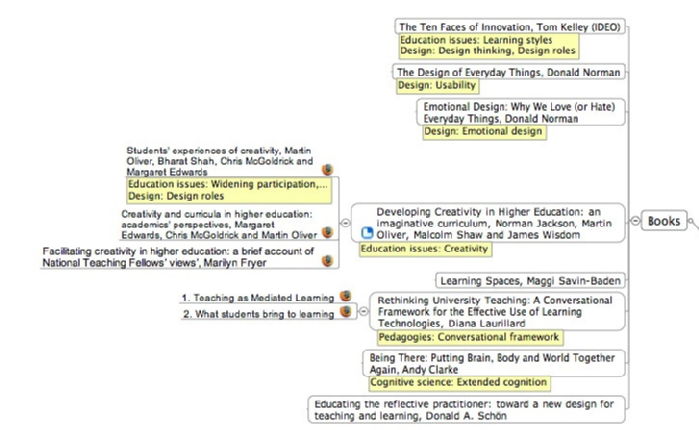
You can also see how each item of literature is being classified using a range of text tags. For example, one article is tagged as being relevant to the "widening paricipation" issue. This keyword tag schema is being developed in the Themes section on the right hand side of the map. I have organised my concepts, issues etc in the following top-level categories:

Opening up the Education Issues node reveals the issues that I am investigating. These issues guide my research process - anything that can have a positive impact here is more worthwhile. I can also assess the impact of conjectures and their consequent practices against their impact on these issues:
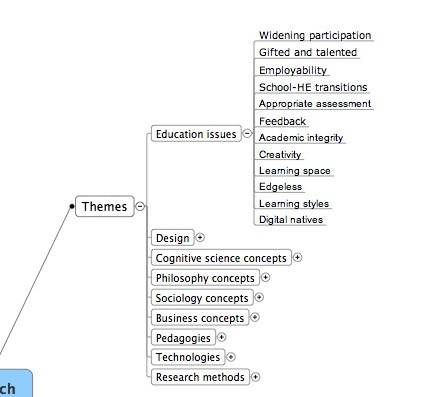
The Design node reveals the concepts taken from the design industry that I am porting across to education. I can use this to unveil the novelty of these approaches, as well as seeking connections in existing pedagogical practice and theory.
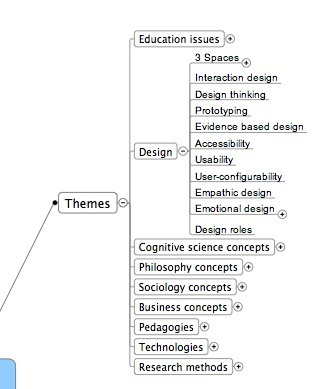
The Pedaogogies node lists existing paradigms with which I can seek such connections and contrasts:
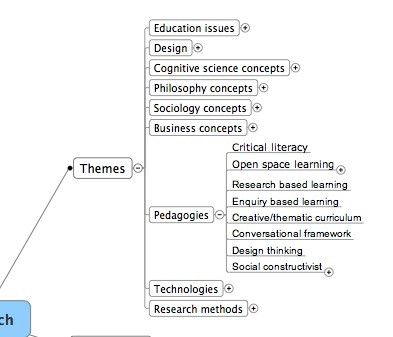
All of these concepts and issues appear within the literature that I am pursuing. Literature records on the left hand side are tagged using terms from the right hand side. As I proceed, I will be able to see areas that need more investigation (using icon markers to identify priorities).
Finally, I will be constructing new ideas and arguments in the Conjectures node. I expect this to become more expansive, detailled and tightly argued as I step through iterations of the discovery-prototype-test process. The Experiments and Investigations node will contain details of formal approaches to evaluating my conjectures:
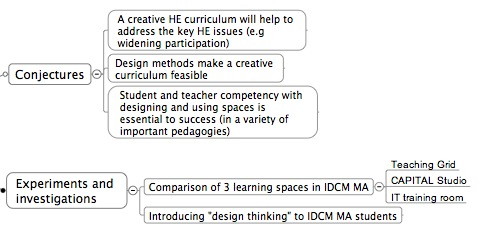
Over time the literature base will grow, but also become more focussed as the need to support very specific conjectures, experiments and investigations becomes more prominent - shifting from an "inspiration" bias towards "implementation" (to use the "design-thinking" paradigm).
 Robert O'Toole
Robert O'Toole



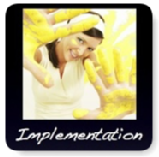

Add a comment
You are not allowed to comment on this entry as it has restricted commenting permissions.